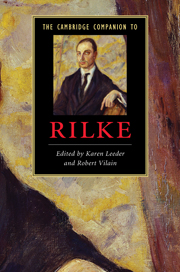Introduction
Published online by Cambridge University Press: 28 July 2010
Summary
Glöcklich, die wissen, dab hinter allen
Sprachen das Unsägliche steht
Happy are those who know that behind
every language there stands the Unsayable
Rainer Maria Rilke (1875-1926) is one the leading poets of European modernism, comparable in importance and influence with American-born T. S. Eliot and the French poet Paul Valéry. Arguably the greatest German poet of the twentieth century, his influence nevertheless extends far beyond poetry and far beyond Germany. His work has been important in philosophy, religion and the visual arts. Despite being famously 'difficult', his work continues to attract new readerships and is regularly translated and re-translated, into Japanese, Chinese and Arabic as well as the European languages.
He features regularly as a source or an inspiration in a variety of creative literatures from across the world and has motivated a host of visual artists; he has often been set to music (classical and rock) and is a staple of television and Hollywood film. Today he even enjoys a reception as a guru of queer studies and New Age thinking. The fact is that Rilke developed tropes of style and attitude that have proved essential for the cultural life of the twentieth century and beyond. To speak of Rilke is to speak of world literature. It is almost impossible to grasp the key elements in the development of modern culture without reference to him.
- Type
- Chapter
- Information
- The Cambridge Companion to Rilke , pp. 1 - 6Publisher: Cambridge University PressPrint publication year: 2010



